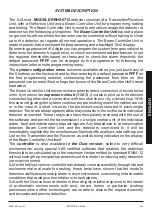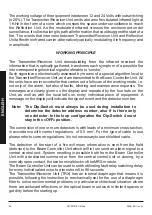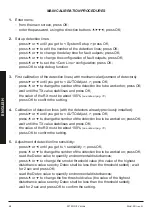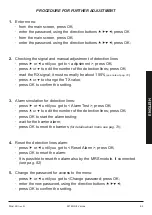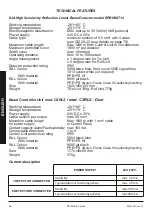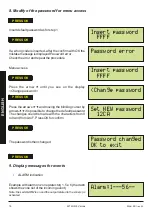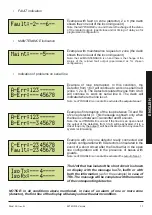
The working voltage of the equipment is between 12 and 24 Volts without switching
(± 20%). The Transmitter/Receiver Unit emits a beam of modulated infrared light at
1 KHz in the form of a cone which crosses the space under surveillance to reach
the Reflection Unit. As the modulated infrared crosses the environment under
surveillance, it collects along its path all information that could suggest the start of a
fire. The events that intervene between Transmitter/Receiver Unit and Reflection
Unit affect the infrared carrier, alternatively optically modulating it in frequency and
in amplitude.
WORKING PRINCIPLE
The Transmitter/Receiver Unit demodulating from the infrared received the
information that is optically gathered, transforms each symptom of a possible fire
into corresponding electrical signals referable to “smoke”.
Such signals are electronically assessed by means of a special algorithm local to
the Transmitter/Receiver Unit, and are transmitted to the Beam Controller Unit. All
the units have a microcontroller that carries out a full scan of the working mode, i.e.
not only of the alarm, but also of faults, blinding and maintenance requests. The
messages are clearly given on the display and repeated by the four leds on the
Unit, as well as with the local led's on every individual piece of equipment. A
message on the display will indicate the type of event and the detector number.
Note: The Dip-Switch must always be used during installation to
determine the detector address number, also if is there only
one detector. In the loop configuration the Dip-Switch 4 must
stay in the «OFF» position.
The connection of one or more detectors is with leads of a minimum cross-section,
2
in accordance with current regulations, of 0.5 mm . For the type of cable to use
please refer to current regulations. It is not necessary to use shielded cable.
The detection of the start of a fire will mean information is sent from the field
(detector) to the Beam Controller Unit which will in turn send an alarm signal to a
central control unit. System resetting is possible both from the Beam Controller
Unit with a dedicated command or from the central control unit or closing, by a
normally open contact, the two terminal blocks of the MRS module.
The Beam Controller Unit can be used to set the blinding fault relay switching delay
for every individual detector, for times from 0 to 90 seconds.
The Transmitter/Receiver Unit (TRX) has an internal diaphragm that means it is
possible, following the instruction to mechanically set for the use of a diaphragm
filter to solve environmental problems in particular architectural situation where
there are awkward reflections or the optical beam must work in limited spaces or
get dirty before the starting up.
ENGLISH
62
Mod. MII
rev. 01
SETRONIC Verona
Содержание ILIA ERHSO712
Страница 1: ......
Страница 3: ...ENGLISH MANUAL ...
Страница 4: ......
Страница 6: ...HIGH SENSITIVITY LINEAR BEAM DETECTOR MODEL ERHS0712 ENGLISH 50 Mod MII rev 01 SETRONIC Verona ...
Страница 15: ...HIGH SENSITIVITY REFLECTION SYSTEM DETECTOR MODEL ERRHS0712 ENGLISH Mod MII rev 01 SETRONIC Verona 59 ...
Страница 24: ...CONTROLLER FOR BEAM DETECTOR MODEL CSRLS MODEL CSRLS Dust 68 Mod MII rev 01 SETRONIC Verona ENGLISH ...














